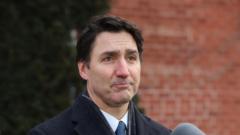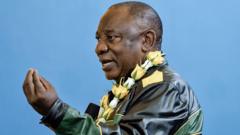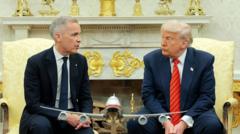With increasing internal challenges and sinking popularity, Justin Trudeau has announced his resignation as Prime Minister of Canada after nearly a decade in power. He will remain in office until a new leader is chosen by the Liberal Party, which is anticipated to select a replacement through a competitive national process. The announcement comes as Canada's political landscape faces uncertainty, with upcoming elections and a decline in support for the Liberal Party.
Trudeau Steps Down: A New Era for Canada Begins

Trudeau Steps Down: A New Era for Canada Begins
Canadian Prime Minister Justin Trudeau resigns amid party pressure, triggering leadership transition and significant political shifts.
In a press conference, Trudeau remarked on the need for a capable leader ahead of the forthcoming elections, acknowledging that internal conflicts within his party limited his effectiveness. Following the sudden resignation of deputy prime minister Chrystia Freeland, who expressed concerns about Canada's economy in the face of threats from incoming U.S. President Donald Trump, Trudeau faced amplified calls to step down. His decision to prorogue parliament until March 2024 further underscores the pivotal changes underway in Canadian politics.
Liberal Party President Sachit Mehra expressed gratitude for Trudeau's leadership, highlighting several key achievements during his tenure, such as transformative social programs. Nevertheless, opposition leaders, including Conservative Party head Pierre Poilievre, criticized the resignation, suggesting that a change in leadership would not drastically alter the party's trajectory.
The Liberal Party's minority governance has faced challenges, especially with losses in support from key partners, pushing Trudeau into a corner as public opinion turned against his administration. Polls indicate that the Conservatives have maintained a substantial lead over the Liberals, further complicating Trudeau's efforts to stabilize his party's position.
Trudeau's legacy includes progressive policies focused on gender equality in governance, Indigenous relations, climate change, and social welfare. However, his administration also encountered significant controversies during his term, ultimately leading to diminishing approval ratings. As Canada navigates through this transitional phase, the selection of a new Liberal leader will play a crucial role in shaping the future political landscape.
Amidst the resignation, some Canadians celebrate the end of Trudeau's era, while others reflect upon his contributions, marking a moment of significant political change for the nation.
As the Liberal Party prepares for the future, discussions on leadership contenders and potential paths forward for the Canadian government are set to intensify in the upcoming months.
Liberal Party President Sachit Mehra expressed gratitude for Trudeau's leadership, highlighting several key achievements during his tenure, such as transformative social programs. Nevertheless, opposition leaders, including Conservative Party head Pierre Poilievre, criticized the resignation, suggesting that a change in leadership would not drastically alter the party's trajectory.
The Liberal Party's minority governance has faced challenges, especially with losses in support from key partners, pushing Trudeau into a corner as public opinion turned against his administration. Polls indicate that the Conservatives have maintained a substantial lead over the Liberals, further complicating Trudeau's efforts to stabilize his party's position.
Trudeau's legacy includes progressive policies focused on gender equality in governance, Indigenous relations, climate change, and social welfare. However, his administration also encountered significant controversies during his term, ultimately leading to diminishing approval ratings. As Canada navigates through this transitional phase, the selection of a new Liberal leader will play a crucial role in shaping the future political landscape.
Amidst the resignation, some Canadians celebrate the end of Trudeau's era, while others reflect upon his contributions, marking a moment of significant political change for the nation.
As the Liberal Party prepares for the future, discussions on leadership contenders and potential paths forward for the Canadian government are set to intensify in the upcoming months.




















